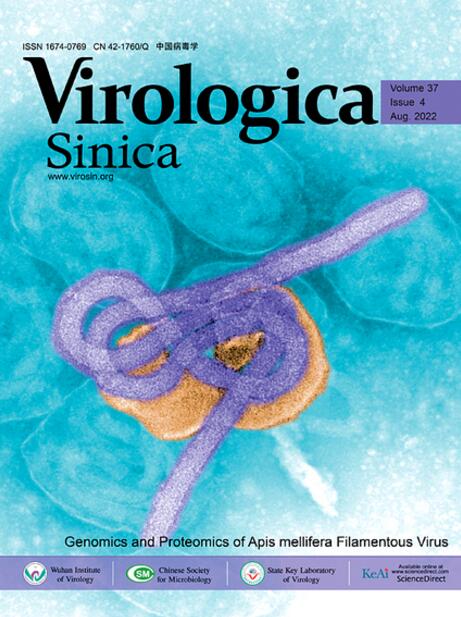SARS-CoV-2-encoded miR-nsp3-3p promotes pulmonary fibrosis by inhibiting expression of ALCAM
IF 4
3区 医学
Q1 Medicine
引用次数: 0
Abstract
microRNAs (miRNAs) derived from viruses, have been detected in body fluids and are known to regulate the expression of host genes. Recent evidence indicates that SARS-CoV-2-encoded miRNAs could contribute to pulmonary disease. Pulmonary fibrosis is an important complication in SARS-CoV-2 infected patients, either during hospitalization or after discharge, however, the underlying mechanisms are not fully elucidated. Here, we report a SARS-CoV-2-encoded miRNA, miR-nsp3-3p, facilitates host pulmonary fibrosis by inhibiting expression of activated leukocyte cell adhesion molecule (ALCAM) and promoting epithelial-mesenchymal transition (EMT). First, we detected miR-nsp3-3p in clinical specimens and found it was remarkably increased in throat swabs and alveolar lavage fluids from severe/critical COVID-19 patients compared to control groups or mild/moderate patients. We further revealed that adeno-associated virus (AAV)-nsp3 infection can induce pulmonary fibrosis in BALB/c mice while miR-nsp3-3p antagomirs can reverse that, and ALCAM was found to be as a target gene of miR-nsp3-3p. miR-nsp3-3p overexpression can inhibit the expression of ALCAM and promote EMT of pulmonary epithelial cells. Moreover, overexpression of ALCAM can reverse the miR-nsp3-3p-induced EMT and fibrosis. These findings highlight the essential role of SARS-CoV-2-encoded miRNAs in promoting the pathological progression of lung disease, and provide novel insights into the interactions between viral miRNAs and host pathology.
sars - cov -2编码的miR-nsp3-3p通过抑制ALCAM的表达促进肺纤维化。
来自病毒的microrna (miRNAs)已在体液中被检测到,并且已知可调节宿主基因的表达。最近的证据表明,sars - cov -2编码的mirna可能导致肺部疾病。肺纤维化是SARS-CoV-2感染患者住院期间或出院后的重要并发症,但其潜在机制尚未完全阐明。在这里,我们报道了sars - cov -2编码的miRNA miR-nsp3-3p,通过抑制活化的白细胞粘附分子(ALCAM)的表达和促进上皮-间质转化(EMT)来促进宿主肺纤维化。首先,我们在临床标本中检测了miR-nsp3-3p,发现重症/危重患者的咽拭子和肺泡灌洗液中miR-nsp3-3p与对照组或轻/中度患者相比显著增加。我们进一步发现腺相关病毒(adeno-associated virus, AAV)-nsp3感染可诱导BALB/c小鼠肺纤维化,而miR-nsp3-3p拮抗剂可逆转这一现象,并且发现ALCAM是miR-nsp3-3p的靶基因。过表达miR-nsp3-3p可抑制ALCAM的表达,促进肺上皮细胞的EMT。此外,ALCAM过表达可以逆转mir -nsp3-3p诱导的EMT和纤维化。这些发现突出了sars - cov -2编码的mirna在促进肺部疾病病理进展中的重要作用,并为病毒mirna与宿主病理之间的相互作用提供了新的见解。
本文章由计算机程序翻译,如有差异,请以英文原文为准。
求助全文
约1分钟内获得全文
求助全文
来源期刊

Virologica Sinica
Biochemistry, Genetics and Molecular Biology-Molecular Medicine
CiteScore
7.70
自引率
1.80%
发文量
3149
期刊介绍:
Virologica Sinica is an international journal which aims at presenting the cutting-edge research on viruses all over the world. The journal publishes peer-reviewed original research articles, reviews, and letters to the editor, to encompass the latest developments in all branches of virology, including research on animal, plant and microbe viruses. The journal welcomes articles on virus discovery and characterization, viral epidemiology, viral pathogenesis, virus-host interaction, vaccine development, antiviral agents and therapies, and virus related bio-techniques. Virologica Sinica, the official journal of Chinese Society for Microbiology, will serve as a platform for the communication and exchange of academic information and ideas in an international context.
Electronic ISSN: 1995-820X; Print ISSN: 1674-0769
 求助内容:
求助内容: 应助结果提醒方式:
应助结果提醒方式:


